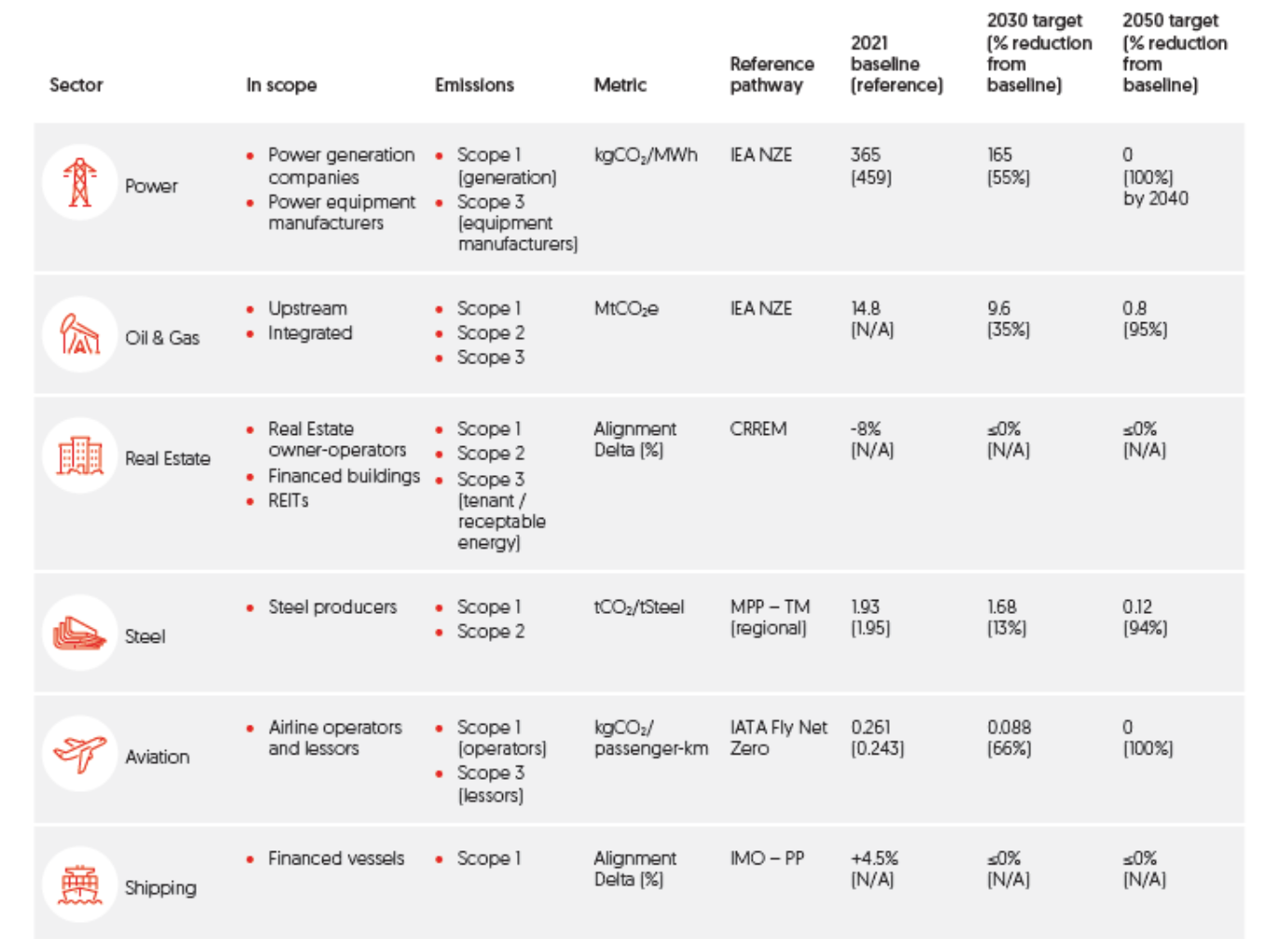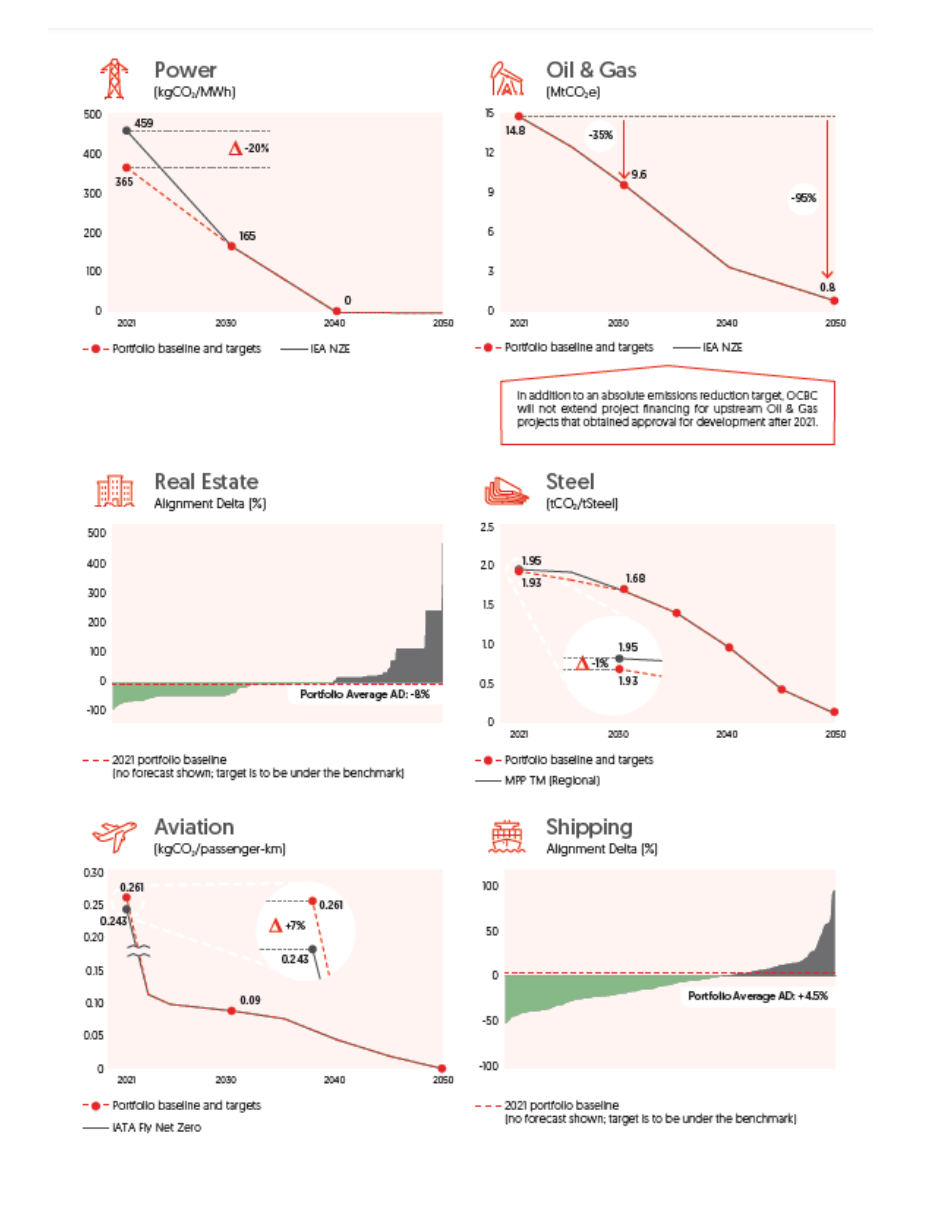OCBC unveils decarbonisation targets for six sectors to achieve Net Zero financed emissions by 2050
OCBC unveils decarbonisation targets for six sectors to achieve Net Zero financed emissions by 2050

To accelerate the decarbonisation of the Oil and Gas sector, the Bank will not extend project financing to upstream Oil and Gas projects that obtained approval for development after 2021.
SINGAPORE, 16 May 2023 – OCBC today unveiled science-based decarbonisation targets for six sectors – Power, Oil and Gas, Real Estate, Steel, Aviation and Shipping – and the key actions that the Bank will take to meet these targets as part of its commitment to achieve Net Zero in its financed emissions by 2050.
The six sectors that OCBC has set targets for in its report Partnering Clients towards a Net Zero ASEAN and Greater China, represent the most greenhouse gas emission intensive sectors that the Bank finances. 42% of OCBC’s corporate and commercial banking loan portfolio falls within the scope of the targets as the Bank focuses on parts of the sector value chains responsible for the majority of the emissions. The availability of established and credible reference pathways for these sub-sectors is another key consideration.
Notably, OCBC will not extend project financing to upstream Oil and Gas projects that obtained approval for development after 2021, as part of its decarbonisation efforts for this sector. This is on top of the target of 35% reduction in absolute emissions by 2030 for the Oil and Gas sector that the Bank has set.
| Sectors | 2030 Target | 2050 Target |
|---|---|---|
| Power | 55% reduction | 100% reduction by 2040 |
| Oil & Gas | 35% reduction | 95% reduction |
| No new project financing for Upstream Oil and Gas projects that are approved for development after 2021 | ||
| Real Estate | Alignment Delta ≤ 0% | Alignment Delta ≤ 0% |
| Steel | 13% reduction | 94% reduction |
| Aviation | 66% reduction | 100% reduction |
| Shipping | Alignment Delta ≤ 0% | Alignment Delta ≤ 0% |
More information on the sectoral decarbonisation targets can be found in Annex A.
Interim targets have been set for 2030 as a checkpoint to ensure the Bank is on track towards its 2050 goal. The targets will be reviewed periodically, at least once every five years, as climate science evolves and more data from clients become available.
The targets are aligned to internationally-recognised, science-based pathways geared towards achieving a net zero level of greenhouse gas emissions by 2050 to limit global warming to 1.5°C.
To drive this transition journey, OCBC will continue to develop sustainable financing solutions for its corporate clients to finance their green and transition business activities.
The Bank will deepen collaboration with stakeholders, from customers and regulators to green technology innovators, to co-create an ecosystem that will help catalyse the development and adoption of innovative technology solutions to accelerate decarbonisation.
Said Ms Helen Wong, OCBC Bank Group CEO, “Our sectoral Net Zero targets are ambitious, quantitative and grounded in science. We will partner our corporate clients to meaningfully contribute to a Net-Zero ASEAN and Greater China by 2050 in an orderly and just transition. These targets are a culmination of months of hard work by many colleagues bank-wide and in our core markets of ASEAN and Greater China.
“Beyond the numbers, this exemplifies key aspects of our vigorously partnership-based approach. I firmly believe that a more sustainable world can be created so long as we are united with our clients and communities in pursuing one.”
The sectoral targets and pathways build on OCBC’s earlier efforts to achieve Net Zero in its goal to build a sustainable future.
The Bank has been proactively engaging its clients to develop and invest in greener assets by offering bespoke sustainable financing solutions.
The OCBC 1.5°C loan, launched in March 2023, is one such example. The loan incentivises corporates to set and work towards clear emissions reduction targets aligned with internationally recognised, science-based decarbonisation pathways for their sectors. When the targets are met or exceeded, corporates can get a reduced interest rate on their loans.
By the end of March 2023, OCBC’s sustainable finance portfolio was $47 billion, placing the Bank well on track to achieving its target of $50 billion by 2025.
On the consumer front, over $3.5 billion in OCBC Eco-Care loans – for homes, renovations and vehicles – have been extended since their introduction in March 2021, incentivising individuals to make more climate-friendly lifestyle choices.
Annex B provides more information on the efforts that the Bank had undertaken over the years to tackle climate change.
Annex A: Sectoral Net-Zero Targets Dashboard


Annex B: Advancing our Sustainability Commitment
| Reducing operational emissions |
|
| Supporting customer transition |
|
| Community projects |
|
